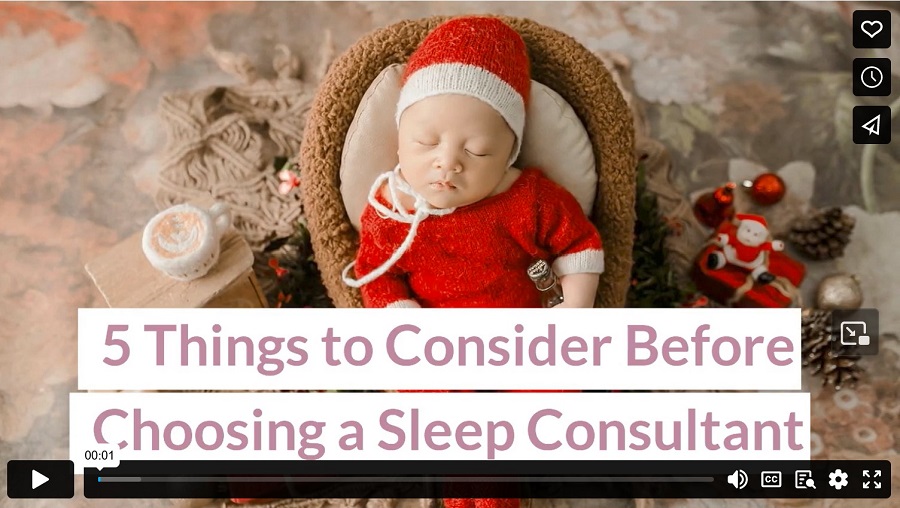When you’re looking for sleep help, it seems like sleep coaches are a dime a dozen offering tips and tricks to get your baby to dreamland (and stay there the whole night). With so many options, how do you narrow things down to the best support system for your family?
We know it can be challenging to sift through the options and decide, so we’ve put together a list of five things you should consider before choosing a sleep consultant.
1. Personalization
Even though many “Mommy Blogs” might try to convince you otherwise, there isn’t one right or wrong way to sleep train your child. Suzie Q’s first baby might have only responded to the Cry It Out Method and started sleeping through the night after two days, but that doesn’t mean that her second or third child will respond the same way. The truth is that what works for one kid might not work for another kid – even within the same family!
Not only are children independent little souls with individual personalities and needs, but you are a new parent with a unique parenting style. When shopping around for baby sleep help, you need to look for a child sleep consultant who will consider your parenting style. Some parents can handle a lot of crying at the beginning and would be up for trying the cry it out method. Other parents can tolerate a little crying but prefer a gentler approach to sleep training. The Ferber sleep method would be a good place to start for them. Other methods are even more gentle – so gentle the baby might not cry much at all throughout the process.
A good child sleep trainer will take your history with sleep training, parenting style, child’s personality, and desired timeframe into account to create a personalized training plan for your family. The program might not fit into the cut-and-dried mold that worked for Suzie Q, but with proper guidance and support, a quality child sleep coach will help you adapt and adjust your sleep training program to achieve the desired results.
2. Various Support Options
You might be a parent at their wit’s end because their baby hasn’t slept more than 20 minutes at a time since birth. OR you might be a parent that’s just confused why their baby has stopped napping well all of a sudden. There isn’t a one-size-fits-all solution when you’re looking for a baby sleep trainer. Different kids have different needs, and you need to look for someone that offers various support options.
Some things to look for include the following:
- Mini sessions for smaller needs like short naps or early wakings
- Free resources regarding common sleep problems
- Webinars
- Age-based sleep training – because the sleep needs of a newborn are not the same as a toddler or school-aged child
- Options for single check-ins or multiple check-ins if there is a significant problem
- Sleep training classes for specific problem areas
- Moderated support groups for connecting with other tired parents
You might need a little help, or you might need a lot of help, so when you’re scouting out a professional, look for someone that offers varying levels of support.
3. Communication
The chances are good that if you’re reading a sleep training blog, you have some questions about how to help your child. You’re tired, frustrated, and probably overwhelmed by the vast amounts of sleep training information on the internet. You need someone who will listen – really listen – to you as you explain the sleep troubles you and your little one are experiencing.
You’ll likely shed a tear or two out of frustration and sleep deprivation, so you need a child sleep consultant that will be empathetic and comforting as you work together to help your family sleep better.
But most importantly, after you wipe away those tears, you need someone who knows their stuff and can get you a good night’s sleep as quickly as possible.
You also need someone who will respond to your concerns in a timely manner. Look for someone who has:
- Unlimited email access for quick questions
- Zoom capabilities that let the consultant see the baby’s room and analyze sleeping conditions
- Phone calls (and optional follow-up phone calls)
- Written resources with helpful tips
- Tracking apps to help you both better understand the sleeping situation
- Podcasts with additional sleep training information
When a sleep coach has a good bedside manner and several communication options, you know that you and your baby be well taken care of.
4. Training
There isn’t a single governing body that defines that makes a sleep coach “qualified,” but there are some training things you should look for when you’re researching options. Some valuable training and certification areas include:
- Experience working with kids of different ages
- Being a licensed lactation consultant
- Formal schooling in child development
- Training regarding different disabilities
- Knowledge of safe sleep practices and products that help sleep
- Education in various sleep training techniques
On top of that, your prospective sleep trainer should have an involved online presence with plenty of positive reviews from parents that have completed the program.
5. Guarantee
There is no beating around the bush here: sleep training can be very expensive. One-time sessions with a certified sleep coach can be as little as $60, but you might pay over a thousand dollars for a more intensive one-on-one sleep training program.
But instead of thinking about the money as a dip into your wallet, think of it as an investment. With better sleep, you can do better in the workplace and during family time. You are safer on the road and have better memory and overall health compared to people with poor sleep. Additionally, the people in your home will be happier and function better throughout the day.
If you’re going to spend your money on sleep training, your infant sleep consultant should have some kind of money-back guarantee. Sleep training could fail for a variety of reasons (sickness, incompatibility, the child being too young, etc.). Though failure is highly unlikely when you are working with a certified pediatric sleep consultant, it does offer peace of mind knowing that there is a money-back option.
Choosing a sleep coach seems like it shouldn’t be complicated, but there are actually a lot of things to consider before taking the plunge. After all, the person you choose could completely change your lives (for the better!) after helping you successfully complete a sleep training program. If you have any additional questions, please don’t hesitate to contact any member of our Slumber Squad today.
Infographic
When choosing a sleep consultant, one must consider their credentials and experience. Look for sleep consultants who specialize in working with children of all ages and have knowledge about sleep disorders, sleep regression, and sleep hygiene best practices. A good sleep consultant should also be able to offer evidence-based solutions that are customized to meet the needs of each family.

Video



